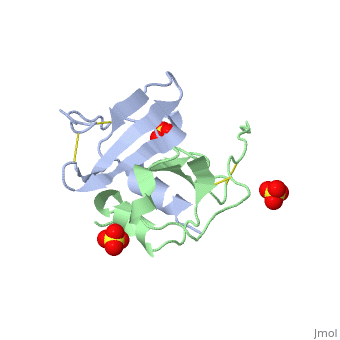C-X-C motif chemokine
From Proteopedia
| Line 28: | Line 28: | ||
[[1rjt]] – hCXCL<br /> | [[1rjt]] – hCXCL<br /> | ||
| - | ===CXCL12 | + | ===CXCL12 (Stromal Derived Factor 1)=== |
| - | + | ||
| - | + | ||
| - | + | ||
| - | + | ||
[[2kec]], [[2ked]], [[2kee]], [[2sdf]], [[1sdf]], [[1vmc]] - hSDF1α – NMR - human<br /> | [[2kec]], [[2ked]], [[2kee]], [[2sdf]], [[1sdf]], [[1vmc]] - hSDF1α – NMR - human<br /> | ||
Revision as of 08:47, 26 August 2014
| |||||||||
| CXCL12α dimer complex with sulfate, 1qg7 | |||||||||
|---|---|---|---|---|---|---|---|---|---|
| Ligands: | |||||||||
| |||||||||
| |||||||||
| Resources: | FirstGlance, OCA, PDBsum, RCSB | ||||||||
| Coordinates: | save as pdb, mmCIF, xml | ||||||||
C-X-C motif chemokine (CXCL) are small chemokines.
• CXCL2 or MIP-2 or imacrophage inflammatory protein 2 acts as chemotactic for polymorphonuclear leukocytes and hematopoietic stem cells.
• CXCL10 or IP-10 or interferon γ-induced protein 10 acts as chemoattractant for monocytes, T cells NK cells and dendritic cells. CXCL10 binds to the cell surface receptor CXCR3.
• CXCL11 or IP-9 or interferon γ-induced protein 9 acts as chemotactic for activated T cells.
• CXCL12 or Stromal-Derived-Factor-1 (SDF1) has a role in angiogenesis, tumor metastasis and the migration of cells from the liver to the bone marrow during embryogenesis.
• CXCL14 or BRAK acts as chemotactic for monocytes and inhibits angiogenesis.
Contents |
3D Structures of C-X-C motif chemokine
Updated on 26-August-2014
CXCL2
3n52 – mCXCL – mouse
1mi2 – mCXCL – NMR
CXCL10
1lv9 – hCXCL – human – NMR
1o7z, 1o7y, 1o80 – hCXCL
2r3z – mCXCL
CXCL11
1rjt – hCXCL
CXCL12 (Stromal Derived Factor 1)
2kec, 2ked, 2kee, 2sdf, 1sdf, 1vmc - hSDF1α – NMR - human
1qg7, 3hp3 - hSDF1α
2k0l, 2k01, 2kol – hSDF1α (mutant) – NMR
1a15, 3gv3 - hSDF1α (mutant)
2nwg - hSDF1α+heparin
2j7z - hSDF1α residues 22-89
2k03, 2k04, 2k05 - hSDF1α (mutant)+ hCXCR4 N-terminal (mutant)
4lmq - hSDF1α + immunoghlobulin heavy chain
CXCL14
2hdl – hCXCL – NMR


